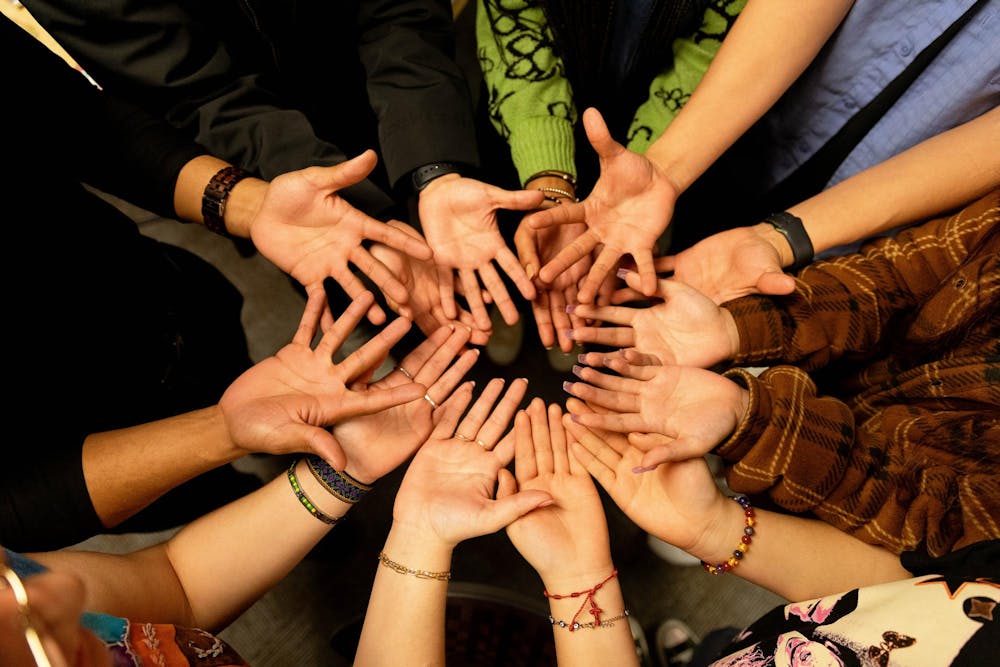On Jan. 22, President Trump signed a morally questionable executive order promising that all diversity, equity and inclusion programs will be terminated, and making DEI illegal. This order is already taking root in many universities nationwide. While Trump calls DEI "radical" and "discriminatory," it is essential that we make it known how valued DEI is so we can set the record straight for the president.
Trump's order: crazy claims and depressing desires
In his executive order, Trump says many laughable things about DEI efforts across the country. The most frustrating aspect of the order, however, is the apparent misunderstanding Trump has regarding how DEI impacts daily lives.
"Individual dignity, hard work, and excellence are fundamental to American greatness. This Executive Order reaffirms these values by ending the Biden-Harris Administration’s anti-constitutional and deeply demeaning 'equity' mandates, terminating DEI, and protecting civil rights," the order reads.
While the claim is protecting civil rights, the reality of disbanding DEI would be suppressing individuals' identities.
Across all forms of media, it has been clear that Trump views DEI as anti-individual, and therefore anti-American, even though DEI focuses on individuals by also focusing on the collective. Reading the order is a truly taxing endeavor that I would not wish upon my worst enemy, as each sentence is somehow more baseless than the previous one, leaving readers to assume that Trump has never been through a DEI program at all.
The order says, "DEI creates and then amplifies prejudicial hostility and exacerbates interpersonal conflict."

Of course, anyone who has successfully seen a DEI program through knows that this is not the case. DEI programs are designed to point out the prejudices that were built into society when our country was formed. Sitting through a DEI session is usually uncomfortable, because the programs are designed to help people learn about the society we live in, which was built on a lot of uncomfortable things, to put it lightly.
Learning about the lives and cultures that were suppressed and destroyed so that modern America could be built is not a fun conversation, but that does not mean that it is not an important one. So long as everyone goes into the conversation open-minded, there is no need for interpersonal conflict.
DEI is education about the unconscious rules and biases that society has forced upon us, and how to break them. However, these conventions suit Trump, so he has no desire to break them.
"DEI’s foundational rhetoric and ideas foster intergroup hostility," the order reads, entirely missing the point of DEI as a concept yet again. Fostering conversation does not equate to fostering hostility. As a whole, DEI was a program that held companies accountable to having these conversations.
While Trump might be outlawing federal DEI programs, that does not mean that individuals need to stop having conversations about these important topics. The first amendment still gives every individual freedom of speech, and he would need much more than an executive order to take that away.
Seeing in color: the true beauty of DEI
The order attempting to end DEI says that Trump's initiative "faithfully advances the Constitution’s promise of colorblind equality before the law," which is concerning for many reasons. First, that promise has yet to be upheld in society in any meaningful way, so to go forward on good faith that this time it will be is absurd. Perhaps more importantly, but less surprisingly, it is yet another example of Trump misunderstanding DEI's intentions. Because "colorblind" is not the goal.
This statement implies that DEI does little more than discuss skin color, when in reality, it focuses on how all aspects of a person's life intersect. For some people, there are multiple cultures at play, and DEI serves to further educate people about the cultural differences that they may encounter with one another. It seems that the sad reality is that Trump, and many like him, still want all cultures to assimilate.
The majority of Americans believe that increasing DEI efforts in their workplace was a positive thing, according to a survey report by Pew Research Center, and that "about two-thirds or more of Black (78%), Asian (72%) and Hispanic (65%) workers say that focusing on DEI at work is a good thing. Among White workers, however, fewer than half (47%) say it’s a good thing; in fact, 21% say it’s a bad thing."
If people of color are more interested, on average, than white people are in DEI, then that is a clear indication that DEI programs are, on some level achieving their goal. We established that DEI conversations are intended to be uncomfortable, but people need to feel uncomfortable in order grow, especially in regard to such a sensitive subject. While white people may not enjoy the feeling, this is proof that it is working because people of color feel that it makes their work experiences better, which matters.
"When it comes to views about how race or ethnicity affects people’s ability to succeed at work, 51% of Black workers say being Black makes it harder to be successful where they work. This is significantly higher than the shares of Asian (41%), Hispanic (23%) and White (18%) workers who say the same about the impact of being Black," the Pew Research reports.
Once again, the fact that a little more than half of Black workers believe that their race makes it harder to be successful makes that very fact true. If someone is made to feel that an aspect of themself is a burden to their work, then it will inevitably manifest itself as a problem, whether internal or external. This is why DEI conversations are crucial, and need to be held more frequently.
Feeling able to speak openly in a safe space is important to having a positive work environment, and DEI programs make it possible to share more information about oneself and their individual needs. While the language used to surround the alleged termination of DEI makes it sound anti-individual, it is quite the opposite. Instead, it starts with the individual and accepts them for who they are and where they come from and then allows the individual to take those parts back to the collective group.
Self-awareness and advocacy are important in order for a person to truly be excellent, which is what Trump claims he wants for American citizens. However, by outlawing DEI programs, Trump asks individuals to keep their truest self's secret, therefore dulling their personal excellence. The world without DEI conversations would be colorblind, but not in the way that is claimed in the order.
Mental health and DEI: are they linked?
There is more to DEI conversations than race, ethnicity, gender, and sexual orientation. DEI also talks about disabilities, physical and mental health conditions, and self-image. All of these things intersect, and affect the way that people interact with their surroundings and workplace and are included in DEI discussions.
As summarized by Uprise Health, "Employees from diverse backgrounds or belonging to marginalized groups often deal with microaggressions, unconscious bias, a lack of representation, and other stressors—all of which play a role in their overall mental health and wellbeing." Conversations about DEI open up a path to have conversations about these stressors, and allow people to learn how they can avoid feeding into them.
Every person has the right to life, liberty and the pursuit of happiness. However, it would be difficult to expect anyone to feel able to pursue happiness when their workplace is hostile. DEI was put in place so that employers who did not value inclusivity would still have to consider it, and removing the programs when they just starting to take root in our society is an injustice to all.
"Organizations must ensure that employees have the support they need to thrive. But making effective, accessible, and culturally appropriate mental health care available is just the beginning. Leadership needs to be educated and empowered to respond appropriately to DEI and mental health issues," Uprise Health reads. DEI has the potential to serve as mental health care that happens before the workplace can harm an employee's well-being.
If DEI efforts were continued, society could benefit to the point where most citizens would already know a lot of the information we learn in programs, and then the discussions could become even more open and productive. Just because our current society was built upon oppressive systems, that does not mean it is impossible to improve matters for the future. While the past is set in stone, honest and productive conversations about modern society are still possible.
Talking about individual identity and how each piece of one's identity affects their experiences in society and their mental health. Taking away these programs will only serve to keep those who are made slightly uncomfortable by them from learning about other people, and themselves.
Our strength: communication and community
The order outlawing DEI ends with, "In America, excellence, grit, and determination is our strength." Despite myself, I can't help but agree with this statement, when it is isolated from the rest of the order. The strength of America comes from our determination to persevere, but all too often, it is America's own social constructs that people have to persevere through.
Excellence comes, in part, from a person's character, and how willing they are to listen to one another and solve problems together. Grit is the courage to continue on, even in the face of adversity, as is determination. Strength is a combination of all of these things, but not in the way that Trump wrote the message. The order seems to suggest that DEI is the opposite of strength, when in reality, it takes true strength to openly talk about your identity.
WSU has worked for years to become a more inclusive and accepting space for students and staff. DEI efforts have paid off, as can be seen by the rich community around the Cultural Identity Centers. It is clear that it has been valued by much of WSU's leadership, and as long as it continues to be a priority to staff as well as students, even the president cannot take DEI away.
Diversity, equity and inclusion are all important aspects of life and should be treated as such by everyone who has the opportunity to participate in DEI programs. While President Trump has already made this order official, meaning that DEI will start being phased out, we cannot give up on this important cause.
If we continue to make a fuss about this outrageous order, then it stands a chance to be overturned. What is important is that WSU staff and students continue on and prioritize DEI now more than they ever have in the past.
While WSU is a relatively small school, we are a mighty community. We must band together to protect the community that we have worked so hard to improve. It is essential that we continue to make progress and communicate more openly about DEI related issues at WSU. So, use your voice and advocate for yourself and your peers by advocating for DEI.












